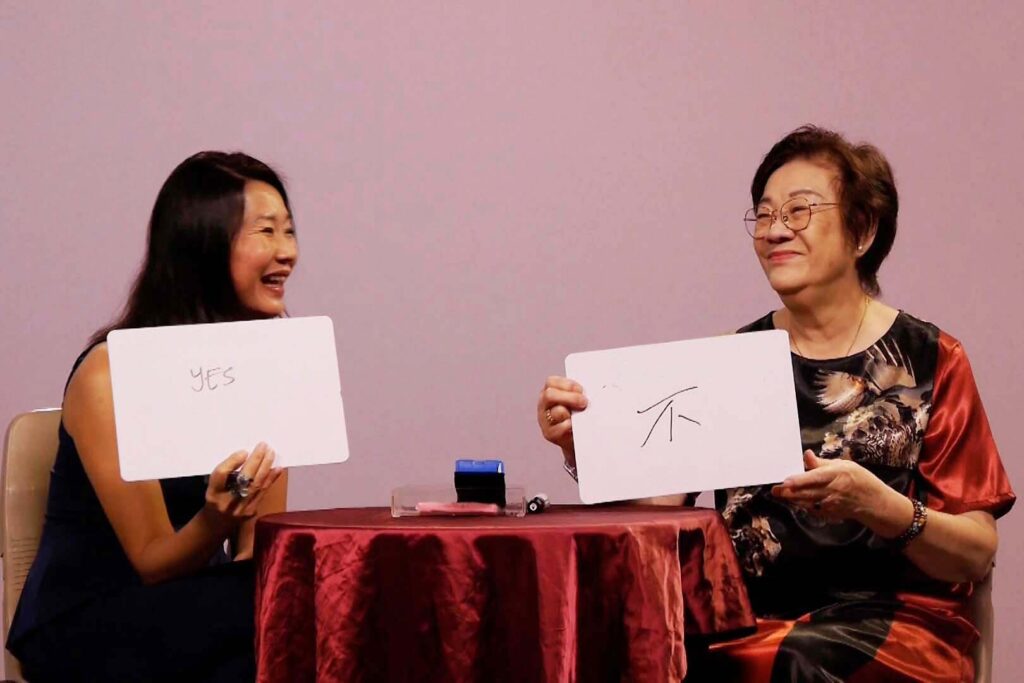How Well Do We Know Our Parents’ End-of-Life Wishes?

When her father passed away, Lillian Tan and her brother stepped up as the main pillars of support for their mother to cope with her grief and sadness. This event speaks volumes of the close bond and shared understanding that Lillian and her mother, Han Geok Leng, 73, have with each other.
Yet, a conversation about her mother’s end-of-life care preferences made Lillian realise that she still had much to learn about her mother.
“It’s a continuous journey to learn about my mum,” the 49-year-old said, “It’s also about me accepting that she doesn’t like certain ways of doing things.”
Lillian added that her personal views and values may not coincide with her mother’s wishes, but this is something that she has to accept.
This conversation, facilitated by the Living Wishes team, consisted of three levels of questions ranging from generic questions about Mdm Han’s favourite food and hobby, to their mother-daughter relationship and Mdm Han’s Advance Care Planning (ACP) preferences.
Disagreements over Advance Care Planning preferences
While Lillian accurately guessed Mdm Han’s favourite food and hobby, the mother-daughter pair made different choices when it came to her ACP preferences. ACP is the ongoing process of planning for our future health and personal care. It involves a discussion and documentation about our personal beliefs and goals with our loved ones and healthcare providers.

When asked if Mdm Han would want to receive cardiopulmonary resuscitation (CPR) if her heart stopped during the last stages of a terminal illness, Lillian said that she would want her mother to receive CPR if it means there is a chance of her mother’s survival.
Meanwhile, Mdm Han disagreed, saying that choosing to perform CPR may not result in a good outcome.
“If the outcome is not good, it’ll be hard for both myself and my children. So why don’t we choose to just let go? This is my decision – there is no right or wrong,” she explained.
Reflecting on their conversation, Mdm Han agreed that ACP is an important process for everyone.
“By communicating our preferences with our children in advance, it can benefit both ourselves and our children,” she shared.
Lillian pointed out that nobody can predict what will happen during one’s end-of-life, which is why such discussions should be done earlier.
Living Wishes’ Survey

Like Lillian, there are many others who may have differing views from their parents’ wishes. In a Living Wishes’ survey among 105 Singapore residents aged 35 to 59, it was found that:
- 51% of respondents do not know what ACP is.
- 84% of respondents have not discussed their parents’ ACP preferences with them.
- 59% of respondents are not aware of what their parents want in their end-of-life health and personal care.
According to the Institute of Policy Studies, there is a culture of silence surrounding end-of-life issues among families in Singapore. This makes it difficult for people to discuss their personal care preferences with their loved ones.
However, ACP is not just about your end-of-life care preferences – it is a deeper conversation to reflect on your life, mortality, values and relationships.
In times of an unexpected medical crisis, our parents may rely on us to make healthcare decisions on their behalf. Therefore, ACP is a crucial conversation to start now – when you and your parents are still healthy and able to have a conversation to make decisions that both of you can accept.
Learn more about Advance Care Planning, or watch Lillian and Mdm Han’s conversation on our YouTube channel!